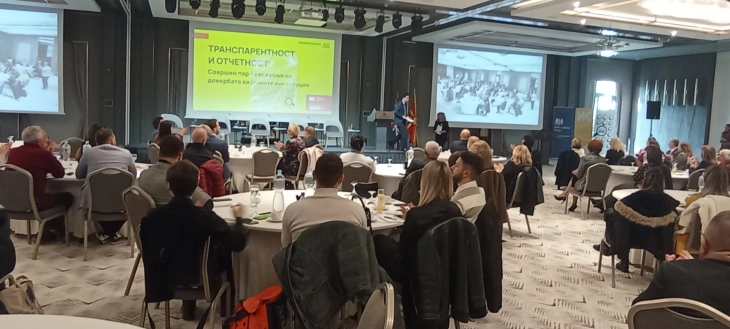Citizens show highest trust in army, lowest for Parliament and Public Prosecutor’s Office: ICS report
- According to the Institute of Communication Studies (ICS) that measures the active transparency index in North Macedonia, in 2016 the government achieved 25 percent transparency and those figures have been slowly growing over the past two years, finally reaching and maintaining one hundred percent transparency, Prime Minister Dimitar Kovachevski said on Tuesday.

Skopje, 12 December 2023 (MIA) - According to the Institute of Communication Studies (ICS) that measures the active transparency index in North Macedonia, in 2016 the government achieved 25 percent transparency and those figures have been slowly growing over the past two years, finally reaching and maintaining one hundred percent transparency, Prime Minister Dimitar Kovachevski said on Tuesday.
In his address before the conference on "Transparency and Accountability: A Perfect Pair for Restoring Confidence in Public Institutions," organized by the Institute of Communication Studies, he said that the total active transparency for institutions in 2023 is 76 percent, in contrast to 2021 with 63 percent and 2016 with 45 percent.
"Since 2017 onward, the government has been open and transparent, and the annual figures prove that. These figures for the government as an institution according to ICS, which measures the active transparency index, show that in 2016 the government showed a 25 percent transparency, which has grown over the past two years and maintains one hundred percent transparency," PM Kovachevski said.
The Ministry of Defense, according to the ICS, has also achieved one hundred percent transparency several years in a row, the Ministry of Finance has 98.1 percent, and the Ministry of Health has 91.3 percent transparency.

"Transparency for us is like a mirror or an X-ray for institutions. This means that citizens read, see and hear every issue, scandal or misunderstanding, which affects their perception. We are satisfied that as a government we are evaluated for transparency and accountability, because we have to pass all control mechanisms, especially the civil ones. The public's eye should be vigilant when it comes to local government enterprises, municipalities and cities, because we must understand that in this county we have divided authority and competencies," Kovachevski said.
According to him, if the government has been able to be fully transparent, other parts of the government should do the same, that is, local self-governments, judicial and legislative authorities. Adding that they would be more advanced if every institution, including the judiciary, could boast their transparency if tax-paying citizens are aware of the number of active cases, their progress and results.
Media, he notes, affects citizens' perception.
"The media have their own fee editorial policies that we support, and have never thought of influencing. The government does not want to regulate media, and I also believe that the judiciary should not do so as well, or regulate what is or should not be media. That should be done by media organization themselves through well-defined criteria," the Prime Minister stressed.
ICS Director, Zhaneta Trajkoska, highlighting data from the research said that the Government (2.8), Parliament (2.7), political parties (2.5), Public Prosecutor’s Office (2.5) and the courts (2.4) are institutions in which citizens have the lowest level of trust.
The President of the country (3.5) police (3.8), and local self-government (3.7) are institutions of the state that enjoy moderate trust, while the army has the highest level of trust.
The media and non-governmental organizations can also be included in the list of institutions in which respondents enjoy low to moderate trust (3.5 percent), including international organizations and alliances, such as the United Nations (3.9), NATO (3.8) and the EU (3.5). While, the average score for religious communities is 4.4 percent.
"There are also negative results for the information citizens receive. There is a lack of trust in the content that is published in the media, and the majority of respondents state that they doubt everything that is published. Thirty percent assume the content published is credible, and only 14% of respondents answered that they believe that everything published in the media is true. Most of the respondents from that 14 percent are young people aged 18-24, which is a positive," Trajkoska said.
She also expressed disappointment in the perceptions regarding accountability of state authorities, with respondents saying that the Government frequently makes excuses for party officials who behave inappropriately.
Parliament and Public Prosecutor's Office, Trajkoska notes, received low marks. Only one percent of respondents agreed that MPs care about the citizens' interest and that procedures initiated by the Public Prosecutor’s Office are often resolved. Adding, "these figures of perceptions and mistrust are a slap in the face for all of us."

British Ambassador to North Macedonia, Matthew Lawson, said that the United Kingdom will fully support the government in dealing with corruption and ensuring greater transparency.
"Corruption is the biggest problem citizens face in this country, but also many others. When I visit different countries I learn from governments that their biggest concern is solving corruption as it undermines democracy and transparency, and lowers trust in institutions. That is why we are proud to be working with all institutions here in the justice and civil sector with the help of our programs," Lawson stated.
He added that the rule of law is of great importance to the United Kingdom, therefore, the UK is one of the biggest investors in North Macedonia. Adding that trade cooperation is worth around EUR 2.3 billion annually. ssh/sk/
Photo/MIA







